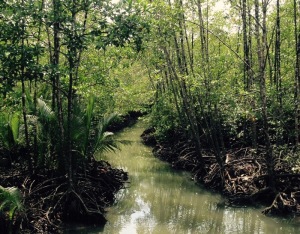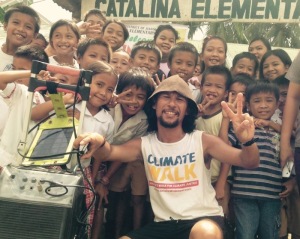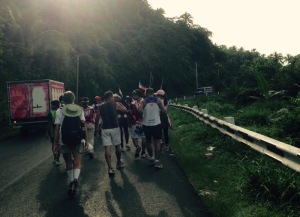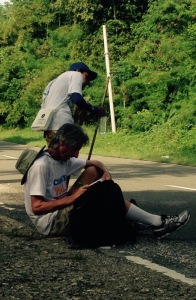By Chuck Baclagon
By 4am, bodies of the Climate Walkers emerge like butterflies from cocoons of sleeping bags and malongs to start their day of walking.
As in the previous days they greet the sun walking the roads still wet with morning dew that gives a distinct scent which reminds us of our intricate connection with nature. Today we ventured east south from Catbalogan City towards Mationg, Samar passing a distance of 18 kilometers which we are able to finish in 5 hours.
Along the way we were greeted by an amazing array of spectacular scenery ranging from mountains in the outskirts of Catbalogan to mangroves along the coastline of Barangay Poblacion 1A in Mationg, which we learned later were instrumental in protecting parts of the community from the storm surge that came when Tropical Storm Glenda (Rammasun) hit their province last July.
In the walk we passed through several elementary schools where we were greeted by children and their teachers. Every 5 kilometers we pause for 15 minutes to catch our breath and re-hydrate. For many of us these breaks are also sanity breaks that help us process what we have seen thus far by writing our thoughts into our journals as while sitting on warm the warm concrete of the high ways were traversing.
By the time we reached Mationg we spent time conversing with people in the communities to talk about their recent experiences with extreme weather and most of them spoke about Typhoon Glenda and how it sucked their homes into the sea with its massive storm surge, that thankfully did not wrought fatalities in their communities as stories of Yolanda’s (Haiyan) destruction caused their local government to spend most of its resources in educating and training the communities in disaster risk reduction.

Mangroves like this one in Barangay Poblacion 1A spared some communities from the storm surge that was brought about by Typhoon Glenda.
The communities in Barangay Poblacion 1 in Mationg are heavily dependent in fishing crabs in the coastline which makes it practical for them to build their houses along close to the shore’s sea wall, which is unfortunate for them as the constant threat of ever frequent and intensifying storms makes it impossible for them to stay in those areas.
This I think is where climate change becomes no longer just an environmental problem but more of a social one as it impedes the development of people living in vulnerable portions of this world from earning a livelihood and their right of having shelter.

School children from Catalina Elementary School strike a pose with Greenpeace’s Albert Lozada and his solar charging station.
Stories like this reminds us of the need to give face to the affected people whose stories get lost in language of diplomacy in international climate negotiations that has yet to reap any substantial commitments from the developed countries to phase out dirty fossil fuels like coal that is the main driver of greenhouse gasses that cause global warming.
It is in learning of their plight and hearing their stories that we continue to take a step forward to Tacloban a place whose countless and nameless victims continue to scream for climate justice.


